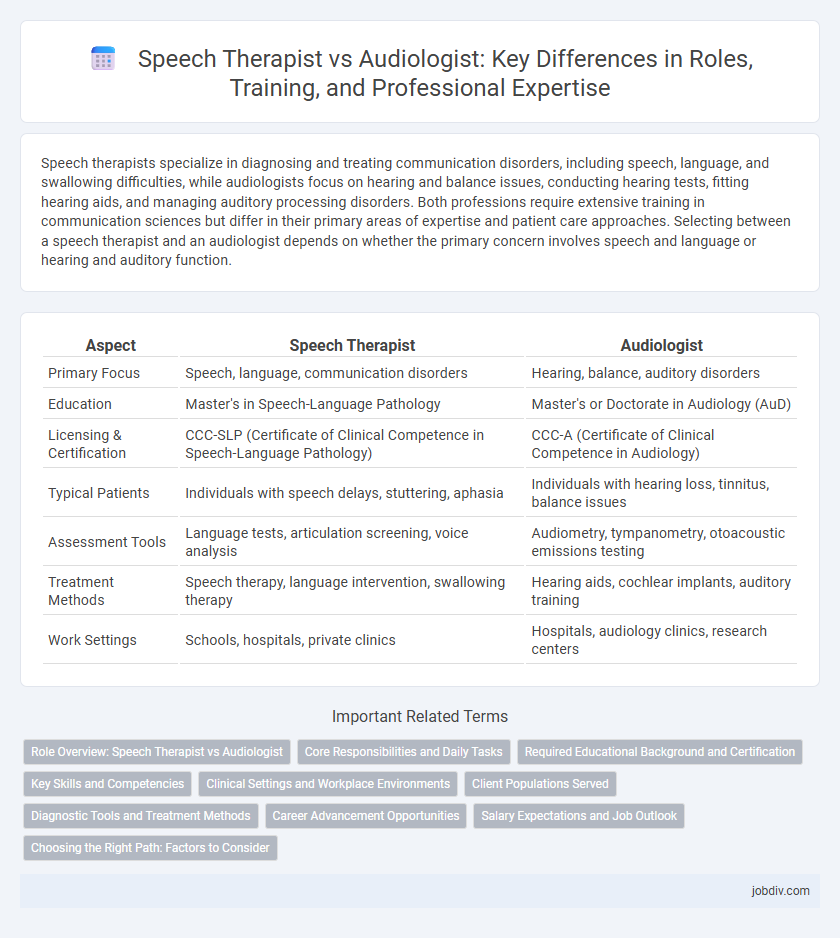Speech therapists specialize in diagnosing and treating communication disorders, including speech, language, and swallowing difficulties, while audiologists focus on hearing and balance issues, conducting hearing tests, fitting hearing aids, and managing auditory processing disorders. Both professions require extensive training in communication sciences but differ in their primary areas of expertise and patient care approaches. Selecting between a speech therapist and an audiologist depends on whether the primary concern involves speech and language or hearing and auditory function.
Table of Comparison
| Aspect | Speech Therapist | Audiologist |
|---|---|---|
| Primary Focus | Speech, language, communication disorders | Hearing, balance, auditory disorders |
| Education | Master's in Speech-Language Pathology | Master's or Doctorate in Audiology (AuD) |
| Licensing & Certification | CCC-SLP (Certificate of Clinical Competence in Speech-Language Pathology) | CCC-A (Certificate of Clinical Competence in Audiology) |
| Typical Patients | Individuals with speech delays, stuttering, aphasia | Individuals with hearing loss, tinnitus, balance issues |
| Assessment Tools | Language tests, articulation screening, voice analysis | Audiometry, tympanometry, otoacoustic emissions testing |
| Treatment Methods | Speech therapy, language intervention, swallowing therapy | Hearing aids, cochlear implants, auditory training |
| Work Settings | Schools, hospitals, private clinics | Hospitals, audiology clinics, research centers |
Role Overview: Speech Therapist vs Audiologist
Speech therapists specialize in diagnosing and treating speech, language, and communication disorders, focusing on improving articulation, fluency, and cognitive-communication skills. Audiologists assess and manage hearing and balance disorders through hearing tests, hearing aid fittings, and auditory rehabilitation. Both professionals collaborate to enhance patients' communication abilities but address distinct aspects of speech and hearing health.
Core Responsibilities and Daily Tasks
Speech therapists specialize in diagnosing and treating speech, language, and communication disorders through personalized therapy sessions. Audiologists conduct comprehensive hearing assessments, manage hearing loss, and fit hearing aids or cochlear implants. Both professionals collaborate to enhance communication abilities but focus respectively on speech production and auditory health management.
Required Educational Background and Certification
Speech therapists typically require a master's degree in speech-language pathology along with state licensure and certification from the American Speech-Language-Hearing Association (ASHA). Audiologists must earn a Doctor of Audiology (Au.D.) degree and obtain certification from the American Board of Audiology (ABA) or ASHA, in addition to state licensure. Both professions demand rigorous clinical training and continuing education to maintain certification and ensure up-to-date practice standards.
Key Skills and Competencies
Speech therapists excel in diagnosing and treating speech, language, and swallowing disorders with strong skills in communication assessment, therapy planning, and patient counseling. Audiologists specialize in hearing and balance disorders, possessing competencies in audiometric testing, hearing aid fitting, and auditory rehabilitation. Both professionals demonstrate a deep understanding of anatomy, pathology, and patient-centered care essential for effective treatment outcomes.
Clinical Settings and Workplace Environments
Speech therapists typically work in clinical settings such as hospitals, rehabilitation centers, and private practices where they focus on diagnosing and treating speech, language, and swallowing disorders. Audiologists often operate in similar environments, including ENT clinics and hearing aid centers, but their primary role centers on assessing and managing hearing and balance disorders. Both professions require collaboration with healthcare teams to tailor individualized treatment plans within multidisciplinary workplace environments.
Client Populations Served
Speech therapists primarily serve clients with speech, language, and communication disorders across all age groups, including children with developmental delays and adults recovering from strokes. Audiologists focus on individuals with hearing and balance disorders, providing services such as hearing evaluations and hearing aid fittings for patients ranging from newborns to elderly adults. Both professionals often collaborate to address overlapping needs in populations with auditory processing and communication challenges.
Diagnostic Tools and Treatment Methods
Speech therapists utilize standardized articulation tests and language assessments to diagnose speech and communication disorders, employing therapy techniques such as phonological exercises and fluency shaping for treatment. Audiologists rely on diagnostic tools like pure tone audiometry, tympanometry, and otoacoustic emissions to evaluate hearing function and auditory processing, prescribing hearing aids or cochlear implants and conducting auditory rehabilitation for intervention. Both professions collaborate closely to address overlapping communication issues, ensuring comprehensive patient care through specialized yet complementary diagnostic and therapeutic methods.
Career Advancement Opportunities
Speech therapists advance by specializing in areas like pediatric therapy, neurogenic communication disorders, or becoming clinical supervisors, enhancing their career scope within healthcare and education. Audiologists progress through roles in research, pediatric or geriatric audiology, cochlear implant programming, or administration, often requiring advanced certifications or doctoral degrees for leadership positions. Both professions offer opportunities in academia, private practice, and interdisciplinary clinics, with career growth dependent on ongoing education and clinical experience.
Salary Expectations and Job Outlook
Speech therapists typically earn a median annual salary of around $80,000, while audiologists have a higher median salary near $85,000, reflecting the specialized nature of hearing disorder diagnosis and treatment. The job outlook for both professions is positive, with speech therapist employment projected to grow 21% and audiologist positions expected to increase by 16% over the next decade due to rising awareness of communication and hearing disorders. Demand in healthcare settings, schools, and aging populations drives consistent job opportunities and competitive salary expectations in these fields.
Choosing the Right Path: Factors to Consider
Choosing between a speech therapist and an audiologist depends on specific communication or hearing needs, educational background, and career interests. Speech therapists primarily address speech, language, and swallowing disorders, requiring a master's degree and certification in speech-language pathology. Audiologists focus on diagnosing and treating hearing and balance disorders, typically holding a doctoral degree and state licensure.
Speech Therapist vs Audiologist Infographic

 jobdiv.com
jobdiv.com